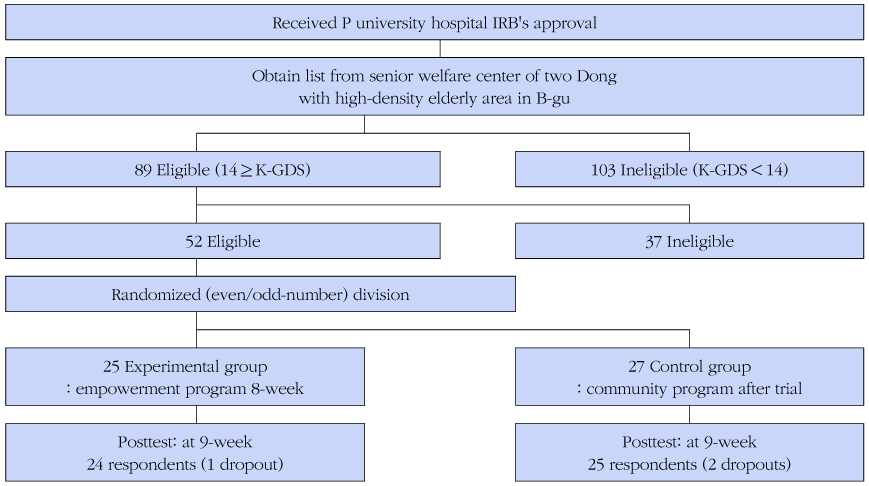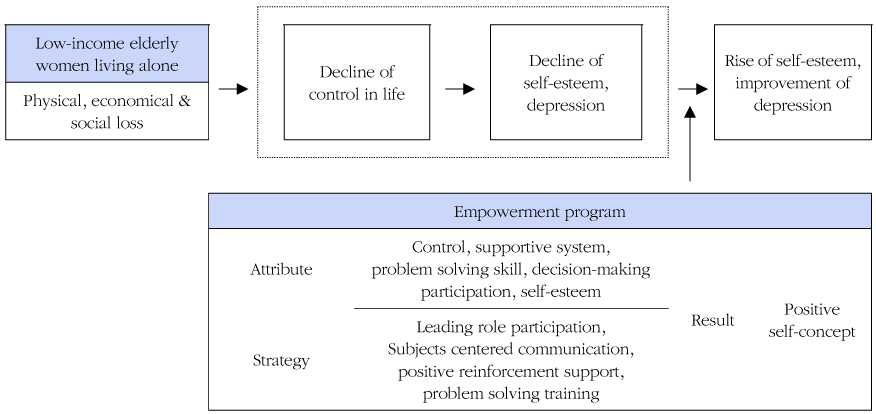J Korean Acad Psychiatr Ment Health Nurs.
2012 Dec;21(4):311-320.
Effects of an Empowerment Program on Self-esteem and Depression for Low-income Elderly Women Living Alone
- Affiliations
-
- 1College of Nursing, Pusan National University, Yangsan, Korea. jss@pusan.ac.kr
Abstract
- PURPOSE
The purpose of this study was to examine the effects of an empowerment program on self-esteem and depression provided through home visits to low-income elderly women who live alone.
METHODS
The research design was a control group pre-post test design. The participants were 49 low-income women over age 65 living alone, 24 in the experimental group and 25 in the control group. The independent variable was the empowerment program, and the dependent variables were self-esteem and depression. The empowerment program was provided for 60 minutes, once a week for 8 weeks. Data were analyzed using the SPSS/WIN 18.0 program.
RESULTS
The experimental group reported significant improvement in self-esteem compared to the control group (t=12.50, p<.001). The experimental group also reported significant improvement in depression scores compared to the control group (t=-9.59, p<.001).
CONCLUSION
The results indicate that the empowerment program has the potential to improve the mental health of low-income elderly women.
Keyword
MeSH Terms
Figure
Reference
-
1. Ahn YH, Kim KK, Kim GY, Song HY. Effects of an empowering program on health quality of life, decision making self-efficacy, self-care competency, and reasonable medical care utilization among low income women households. J Korean Acad Public Health Nurs. 2010. 24:237–248.
Article2. Conner KO, Copeland VC, Grote NK, Koeske G, Rosen D, Reynolds CF, et al. Mental health treatment seeking among older adults with depression: The impact of stigma and race. Am J Geriatr Psychiatry. 2010. 18:531–543.
Article3. Galea S, Ahern J, Nandi A, Tracy M, Beard J, Vlahov D. Urban neighborhood poverty and the incidence of depression in a population-based cohort study. Ann Epidemiol. 2007. 17:171–179.
Article4. Jang MH, Kim YH. The relationship of stress, depression and suicidal ideation in the elderly. J Korean Acad Psychiatr Ment Health Nurs. 2005. 14:33–42.
Article5. Jang MH, Won JS. Association of anger and anger expression, social support, self-esteem, and depression in elderly. J Korean Acad Psychiatr Ment Health Nurs. 2009. 18:259–268.
Article6. Jeon BJ. Self-esteem: A test of its measurability. Yonsei Form. 1974. 11:107–129.7. Jin MO. Effects of empowerment program for the elderly patients in the geriatric hospital the empowerment state, depression and activity of daily living. 2008. Busan: Kosin University;Unpublished master's thesis.8. Jung IK, Kwak DI, Joe SH, Lee HS. A study of standardization of Korean form of geriatric depression scale (KGDS). J Korean Geriatr Psychiatry. 1997. 1:61–72.9. Kim HM, Choi YH. Factors affecting depression in elderly vulnerable people living alone. J Korean Community Nurs. 2001. 12:428–436.10. Kim JY, Lee JM. The relationship of life-stress and depression between the poor elderly women and ordinary elderly women: Focus on control effect of self-esteem and social support. J Welf Aged. 2008. 39:399–420.11. Kim OS, Yang KM, Kim KH. Dependency, abuse, and depression by gender in widowed elderly. J Korean Acad Nurs. 2005. 35:336–343.12. Lawton MP, Brody EM. Assessment of older people: Self-maintaining and instrumental activities of daily living. Gerontologist. 1969. 9:179–186.13. Lee GS. The effect of empowerment education program on the empowerment and mental health of delinquent juveniles. 2003. Gwangju: Chonnam National University;Unpublished doctoral dissertation.14. Lee JH. The relationship of depression, self-esteem and health-promoting behaviors in the elderly women who live alone. J Korean Acad Psychiatr Ment Health Nurs. 2005. 14:109–118.15. Lee JH, Jung NW, Joe SH. Fundamentals of counseling psychology. 2005. Seoul: Hakjisa.16. Lee SY. The effects of health behavior-related characteristics, self-esteem, activities of daily living, and family support on depression in the community-dwelling elderly. J Korean Acad Community Health Nurs. 2010. 21:489–501.17. Leis JA, Mendelson T, Tandon SD, Perry DF. A systematic review of home-based interventions to prevent and treat postpartum depression. Arch Womens Ment Health. 2009. 12:3–13.18. Levy LB, O'Hara MW. Psychotherapeutic interventions for depressed, low-income women: A review of the literature. Clin Psychol Rev. 2010. 30:934–950.19. Lim QL, Kim HK, Ann JS. Relationship between depression and quality of life in elderly women living alone: The moderating and mediating effects of social support and social activity. J Korean Gerontol Soc. 2011. 31:33–47.20. Ministry of Health and Welfare. 2008 Survey of the elderly: National elderly living conditions and welfare needs. 2009. Seoul: Author.21. National Health Insurance Corporation. 2009 Survey of medical fee of enrolled patients by national health insurance. 2010. Seoul: Author.22. Park KM. The effect of an empowerment health management program on self-esteem and the quality of life for the urban elderly. J Korean Acad Community Health Nurs. 2008. 19:226–233.23. Park MJ. Buffering effects of strengths and social support between stress and depression of the elderly women. Korean J Woman Psychol. 2007. 12:197–211.24. Park SK, Moon SK. A study on the psychological empowerment of elderly with physical disabilities. J Korean Gerontol Soc. 2006. 26:77–89.25. Rosenberg M. Rosenberg M, editor. Measurement of self-esteem. Society and the adolescent self image. 1965. New York: Princeton University Press.26. Shin JS, Lee YB. The effects of social supports on psychosocial well-being of the unemployed. Korean J Soc Welf. 1999. 37:241–269.
Article27. Son SH. Differences in cognitive fuction and activities of daily living between two groups with and without depression among patients. 1998. Seoul: Yonsei University;Unpublished master's thesis.
Article28. Suh KH, Kim YS. Self-esteem and depression of the elderly people living alone. Korean J Psychol Soc Issues. 2003. 9:115–137.
Article29. Tu YC, Wang RH, Yeh SH. Relationship between perceived empowerment care and quality of life among elderly residents within nursing homes in Taiwan: A questionnaire survey. Int J Nurs Stud. 2006. 43:673–680.
Article30. Yesavage JA, Brink TL, Rose TL, Lum O, Huang V, Adey M, et al. Development and validation of a geriatric depression screening scale: A preliminary report. J Psychiatr Res. 1982-1983. 17:37–49.
Article31. Zimet GD, Dahlem NW, Zimet SG, Farley GK. The multidimensional scale of perceived social support. J Pers Assess. 1988. 52:30–41.
Article
- Full Text Links
- Actions
-
Cited
- CITED
-
- Close
- Share
- Similar articles
-
- Correlational Study of IADL, Self-Esteem, Empowerment of Elderly People Living at Home
- The Effect of an Empowerment Health Management Program on Self-esteem and the Quality of Life for the Urban Elderly
- The Effects of Exercise Program on Knowledge and Attitude of Excercise and Depression in Low-Income Elderly Women
- Effects of an Empowerment Program on Nicotine Dependency, Temptation, Self-esteem, Depression in Adolescents Who Smoke
- Factors Influencing Depression in Elderly People Living at Home



